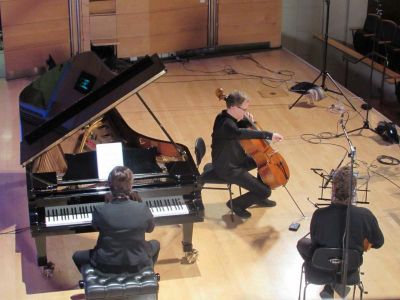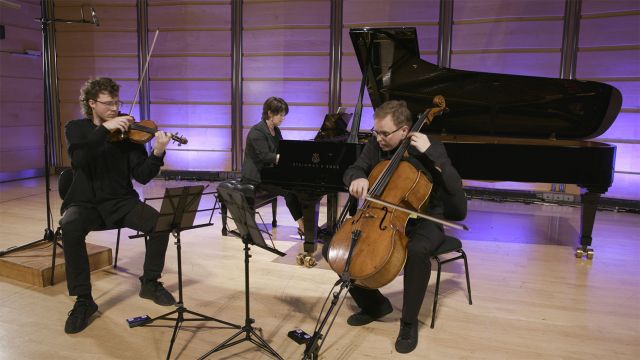Selby & Friends present Beethoven’s Ghost
Pianist Kathryn Selby’s second concert since lockdown was recorded in Sydney’s beautiful – but sadly empty - City Recital Hall. With violinist Harry Ward and cellist Timo-Veikko Valve she presents a special tribute to celebrate the 250th birthday of Ludwig van Beethoven. The concert is “centred on Beethoven’s revolutionary ‘Ghost’ Piano Trio, bookended by his much-loved C minor Trio Opus 1, No. 3 and Beethoven’s own arrangement for piano trio of his spectacular Symphony No. 2”.
It is strange to watch the performers walk on to the stage without the applause with which they are usually greeted – and to see them complete their performances with the usual flourish, but without the customary bow and appreciative ovation. Despite this, they presented an intensively rehearsed and emotionally charged concert to delight their performance-starved audience who, via the clever work of the camera crew, were able to follow closely the concentration and muscular intensity required by Beethoven’s compositions.
Opus 1, No 3 begins softly, eerily moving into a jaunty lightness that becomes more complex, making the musicians work hard, fingers speeding, watching each other for changes in cue as the emotion builds. It’s almost a teasing composition, taunting both musicians and listeners with variations on the motif and the way they branch away and dart back. Changes in tempo and mood are reflected in the faces of the musicians as thy respond to the growing strength and power that is almost strident before unexpectedly returning to a gentle more reflective conclusion.
 The Ghost Piano trio was composed when Beethoven was working on an opera based on Shakespeare’s Macbeth but his friend and pupil Carl Czerny felt that it reminded him more of the appearance of the ghost of the king in Hamlet. Thus, the origin of ‘The Ghost Trio’. It begins strongly, the strings and piano melding in fast tempos that change to lighter variations that seem to flit through the movements until they are sustained into controlled passages that evoke moodiness and unrest.
The Ghost Piano trio was composed when Beethoven was working on an opera based on Shakespeare’s Macbeth but his friend and pupil Carl Czerny felt that it reminded him more of the appearance of the ghost of the king in Hamlet. Thus, the origin of ‘The Ghost Trio’. It begins strongly, the strings and piano melding in fast tempos that change to lighter variations that seem to flit through the movements until they are sustained into controlled passages that evoke moodiness and unrest.
It must have seemed strange for Timo-Veikko Valve and Harry Ward to be performing Beethoven’s Piano Trio in D Major (an arrangement including every note of his spectacular Symphony No. 2 version condensed into a trio) when only a few months before they had played the symphony with a full orchestra on the same stage where, with Kathryn Selby, they now played to an empty auditorium. This time the violin and cello would play their parts, and in Valve’s words, Selby at the piano “would pick up all the parts of the orchestra”.
The composition is fast-paced and demanding in its changing tempo and emotions. The musicians reflect this in their faces. As the camera moves closer to them it is clear that their concentration is intense and enormous energy is required by the intricacy of the composition. It is an exciting piece that captures the imagination of the listener because of the changes in mood and pace that build evocatively through the movements.
At a difficult time for the arts, it is important that entrepreneurial artists such as Selby are able to find ways to keep sharing their art – and keep reminding audiences of the many artists that are “waiting in the wings” for a real rather than virtual audience, and a more lucrative living.
Carol Wimmer
Subscribe to our E-Newsletter, buy our latest print edition or find a Performing Arts book at Book Nook.

